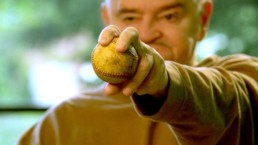Documentary ‘Fastball’ Explains the Science Behind the Perfect Pitch
This is a custom heading element.
About halfway through the documentary Fastball, the phenomenon of the ‘rising fastball,’ is discussed. It’s an occurrence that is just as it sounds – a ball thrown so hard that — as many hitters claim — ascends, ever so slightly, as it crosses the plate. While interviewing the former all-time home run king Hank Aaron, director Jonathan Hock asserts that “scientists say it can’t happen.” Before he can even finish, Aaron shakes his head and grins: “I don’t think they ever played baseball.”
Such is the heart of what make baseball such a romantic game. The relationship between the pathos of baseball lore and the logos of its statistic-obsessed present makes it arguably the most fascinating sport in the world. Narrated by baseball film all-star Kevin Costner (for those – pun intended – keeping score, he’s carried out a – pun also intended – triple play with Bull Durham, Field of Dreams, and For the Love of the Game), Fastball explores this increasingly complex dichotomy through one of the most simple, yet terrorizing aspects of the game, the fastball pitch.
Off the bat (pun not intended), director Jonathan Hock levies himself a classicist for the game. The film is mostly populated with 20th-century greats such as Nolan Ryan, Joe Morgan, Rich “Goose” Gossage, Mike Schmidt, Al Kaline, etc., reflecting on the nastiest fastballs they have faced and the pitchers who threw them. Some contemporary stars such as Justin Verlander, David Price and Brandon Phillips appear in the mix as well, giving the film an effective sense of history and continuing significance. It’s close to being baseball’s version of The Aristocrats, the controversial 2005 documentary that featured 100+ comedic legends reminiscing about who delivers the funniest rendition of the infamous titular joke. In a similar fashion, Fastball’s big question is who threw the fastest pitch in baseball history. Using modern science and applying it to the lore of the pre-radar gun days, the film eventually determines who really did throw the fastest pitch in history. For fans, it shouldn’t come as a surprise. But, in a sense, the film could really care less about the answer to that question. The climactic reveal is perhaps one of the tamer moments of the entire runtime. Instead, Hock’s has crafted a series of fascinating – if not very scatterbrained – diversions exploring the mythology of baseball’s more interesting players.
A brief section of Cardinals legend Bob Gibson and his 1968 season – widely considered one of, if not the best, seasons ever on the mound – dives into the psychology of athletic dominance. Both eloquent and honest in his own screen time, he is presented as a complicated figure that deserves his own feature-length documentary. Nolan Ryan, the all-time strikeouts leader, also discusses similar philosophies ever too briefly. This leads to perhaps Fastball’s biggest downside. It’s erratic nature, jumping back and forth through multiple baseball eras, leaves the thought that perhaps it should be expanded into something larger. The question of who really did throw the fastest pitch is an interesting one, but in the end, it is the complicated stories of Gibson, Nolan, Steve Dalkowski – a fastballer who never reached the majors – and other players that stick and deserve more time than the brief chapters they are given here.
Hock does bring in some fascinating science into the film as well. Both cognitive and physics experts add some compelling technical explanations to the psychology of the game. Segment attempting to debunk the aforementioned ‘rising fastball’ phenomenon prove quite interesting and the mathematics used to calculate and adjust the fastest pitches of Walter Johnson, Bob Feller, Nolan Ryan and Aroldis Chapman are equally as neat. While these statistics are engaging, it could feel a little alienating for anybody outside of the ESPN Classic crowd, who is not a deep fan of the intricacies of the sport. Thus, in a roundabout way, Fastball proves that the magic of the game is more than numbers. The sport is perhaps one of the timeless narratives in sport history.
Fastball is now playing in theaters and On Demand.
Jasper Bernbaum
Jasper is a contributing writer for Cinemacy. He combines his love of music with his visual eye into a passion for live photography. He holds a BFA in Film Production from Chapman University and is an avid filmmaker, watcher, and all around cultural adventurer.


